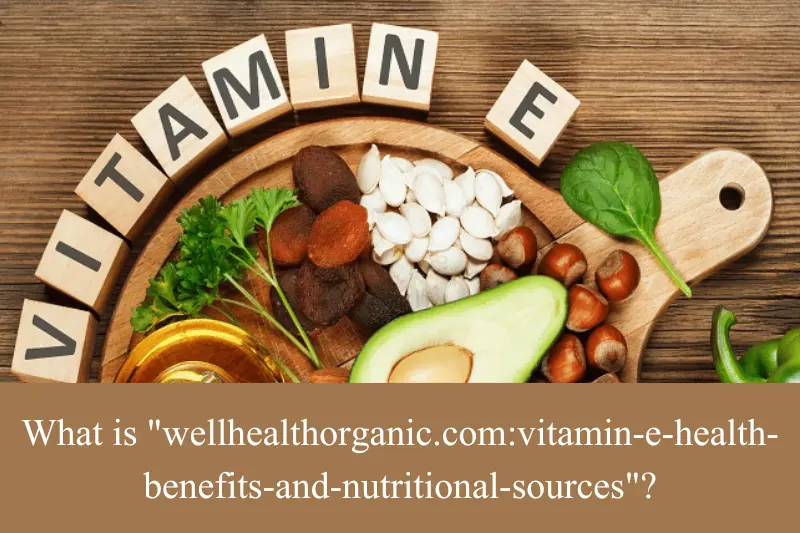Vitamin E stands as a cornerstone of optimal health, offering a multitude of benefits crucial for overall well-being. From bolstering immunity to nurturing skin health, its significance reverberates through various bodily functions. At Wellhealthorganic.Com, we delve into the plethora of health advantages linked to vitamin E and unveil its rich nutritional sources, empowering you to harness its potential for a healthier lifestyle.
Unveiling Vitamin E
What is Vitamin E?
Vitamin E, a fat-soluble nutrient, exists in eight distinct forms, with alpha-tocopherol reigning as the most biologically active variant in the human body. This antioxidant agent stands guard against cellular damage inflicted by free radicals, unstable molecules notorious for precipitating chronic ailments and premature aging.
Health Benefits of Vitamin E
1. Antioxidant Shield
Vitamin E serves as a stalwart defender against oxidative stress and free radicals, fortifying cells, tissues, and organs against deleterious harm. By neutralizing free radicals, vitamin E champions overall health and potentially curtails the onset of chronic maladies like heart disease, cancer, and neurodegenerative disorders.
2. Immune Reinforcement
Integral to immune function, vitamin E bolsters the activity of immune cells such as T cells and natural killer cells, which spearhead the body’s defense against infections and diseases. A sufficient intake of vitamin E is indispensable for nurturing a resilient immune system and mitigating infection risks.
3. Skin Nourishment
Renowned for its skin-revitalizing prowess, vitamin E shields the skin against UV radiation, environmental pollutants, and oxidative stressors. Furthermore, it fosters skin hydration, elasticity, and regeneration, rendering it a coveted ingredient in skincare formulations and supplements.
4. Cardiovascular Guardian
Evidence suggests that vitamin E could confer benefits to heart health by ameliorating inflammation, enhancing blood vessel function, and thwarting LDL cholesterol oxidation. By safeguarding against cardiovascular afflictions, vitamin E potentially diminishes the incidence of heart disease and stroke.
5. Ocular Safeguard
Critical for maintaining ocular health, vitamin E staves off age-related eye disorders such as cataracts and macular degeneration. Functioning as an ocular shield, vitamin E defends eye cells against oxidative harm, potentially preserving visual acuity with advancing age.
Nutritional Sources of Vitamin E
1. Nuts and Seeds
Nuts and seeds emerge as veritable troves of vitamin E, with almonds, sunflower seeds, hazelnuts, and peanuts standing out as particularly rich sources. Introducing a handful of nuts or seeds into your daily regimen can substantially augment your vitamin E intake.
2. Vegetable Oils
A cornucopia of vitamin E awaits in vegetable oils like sunflower oil, safflower oil, wheat germ oil, and olive oil. Employ these oils in culinary endeavors or as dressings for salads and vegetables to elevate your vitamin E consumption.
3. Leafy Green Vegetables
Dark leafy greens such as spinach, kale, and Swiss chard boast noteworthy vitamin E content, alongside an array of other indispensable nutrients. Diversifying your leafy green intake can furnish an ample supply of vitamin E to fortify overall health.
4. Fortified Foods
Certain foodstuffs, including breakfast cereals, fruit juices, and plant-based milk alternatives, undergo fortification with vitamin E to enhance their nutritional profile. Peruse product labels to ascertain their vitamin E potency.
5. Fruits
While fruits like avocados, kiwifruit, and mangoes harbor vitamin E in more modest quantities, their inclusion in your dietary repertoire can contribute to overall intake. Incorporate these fruits into your meals for a vitamin E boost.
Recommended Daily Intake of Vitamin E
The recommended daily intake of vitamin E hinges on factors such as age, gender, and life stage. For adults, the recommended dietary allowance (RDA) for vitamin E stands at 15 milligrams (22.4 international units) per day. Individual requirements may fluctuate based on health status, activity level, and specific wellness objectives.
What is “wellhealthorganic.com:vitamin-e-health-benefits-and-nutritional-sources”?

“wellhealthorganic.com:vitamin-e-health-benefits-and-nutritional-sources” refers to a comprehensive guide that explores the various health benefits and nutritional sources of Vitamin E.
Essentially, it’s a resource that provides valuable information about how Vitamin E can positively impact your health and where you can find it in your diet.
Whether you’re curious about the benefits of Vitamin E or interested in incorporating it into your daily nutrition, this guide is here to help you understand all there is to know about this essential nutrient.
Why is “wellhealthorganic.com:vitamin-e-health-benefits-and-nutritional-sources” Important?
Essential Antioxidant Protection:
- Vitamin E is a potent antioxidant that helps protect your cells from damage caused by free radicals, thereby reducing the risk of chronic diseases like cancer and heart disease.
Skin Health and Beauty:
- Vitamin E plays a crucial role in maintaining healthy skin by promoting cell regeneration, moisturization, and protection against UV damage, resulting in youthful and radiant skin.
Immune System Support:
- By bolstering the immune system, Vitamin E helps your body defend against infections and illnesses, keeping you healthy and resilient year-round.
Heart Health Maintenance:
- Vitamin E contributes to heart health by preventing the oxidation of LDL cholesterol, reducing the risk of plaque buildup in arteries and lowering the chances of cardiovascular diseases.
Eye Health Enhancement:
- Studies suggest that Vitamin E may help prevent age-related macular degeneration and cataracts, promoting better vision and eye health as you age.
Brain Function Improvement:
- Vitamin E has been linked to improved cognitive function and reduced risk of cognitive decline in older adults, potentially delaying the onset of conditions like Alzheimer’s disease.
Reproductive Health Support:
- For both men and women, Vitamin E plays a role in fertility and reproductive health by protecting reproductive cells from oxidative damage and supporting hormone balance.
Muscle Recovery and Repair:
- Athletes and active individuals can benefit from Vitamin E’s ability to reduce exercise-induced oxidative stress, aiding in muscle recovery and repair after strenuous workouts.
Hair Growth and Strength:
- Vitamin E promotes healthy hair growth and strength by improving blood circulation to the scalp, nourishing hair follicles, and preventing oxidative stress that can lead to hair loss.
Essential Properties of Vitamin E
- Antioxidant: Neutralizes free radicals, preventing cell damage and oxidative stress.
- Strengthens the immune system: Contributes to the normal function of immune cells and protects against infections.
- Protects cardiovascular health: Reduces the risk of heart disease by decreasing the oxidation of LDL (“bad”) cholesterol.
- Maintains skin health: Promotes skin elasticity and hydration, delaying the appearance of wrinkles and signs of aging.
- Enhances eye health: Prevents age-related macular degeneration and cataracts.
- Cognitive function: Protects brain cells from oxidative damage and may help prevent neurodegenerative diseases like Alzheimer’s.
Subsection: The Different Forms of Vitamin E
There are several forms of vitamin E, with alpha-tocopherol being the most common and biologically active form in the human body. Other forms include beta-tocopherol, gamma-tocopherol, and delta-tocopherol, each with its unique properties and benefits. Understanding the different forms of vitamin E can help individuals make informed choices when it comes to supplementation or dietary intake.

Exploring the Various Health Benefits of Vitamin E
Vitamin E is a powerful antioxidant that plays a crucial role in maintaining good health. It helps protect cells from damage caused by free radicals, which can lead to chronic diseases such as heart disease and cancer. Additionally, vitamin E is known for its anti-inflammatory properties, which can help reduce the risk of conditions like arthritis and asthma. Furthermore, vitamin E has been linked to improved eye health, as it helps protect the cells in the eyes from oxidative stress.
Research has also shown that vitamin E may have benefits for brain health, as it can help prevent cognitive decline associated with aging. Some studies suggest that vitamin E may even aid in the prevention of conditions like Alzheimer’s disease. Moreover, vitamin E is essential for maintaining healthy skin and hair, as it helps protect against UV damage and promotes skin repair. With all these health benefits, it is clear that incorporating sufficient vitamin E into your diet is crucial for overall well-being.
Top Nutritional Sources of Vitamin E for a Balanced Diet
Vitamin E is a powerful antioxidant that plays a crucial role in maintaining good health. Including vitamin E-rich foods in your diet is essential for proper cell function and overall well-being. Some of the top nutritional sources of vitamin E include nuts, seeds, and green leafy vegetables.
Nuts and seeds like almonds, sunflower seeds, and hazelnuts are excellent sources of vitamin E. Incorporating these into your daily meals or snacks can help ensure you are meeting your daily vitamin E requirements. Additionally, green leafy vegetables such as spinach, kale, and broccoli are also rich in vitamin E and provide a host of other essential nutrients for optimal health.
Understanding the Role of Vitamin E in Boosting Immune System Function
Vitamin E plays a crucial role in supporting our immune system’s function. It is a powerful antioxidant that helps protect our cells from damage caused by free radicals, thereby enhancing our body’s defense mechanisms against infections and diseases. By neutralizing free radicals, vitamin E helps reduce inflammation and promotes the proper functioning of immune cells, such as T cells and B cells, which are essential for identifying and destroying harmful pathogens.
Furthermore, vitamin E has been shown to regulate the immune response by modulating cytokine production and signaling pathways. This can help the immune system differentiate between foreign invaders and healthy cells, preventing autoimmune reactions. Adequate levels of vitamin E in the body are essential for maintaining a robust immune system and overall wellbeing. To ensure optimal immune function, it is important to include vitamin E-rich foods in your daily diet or consider supplementation under the guidance of a healthcare provider.
How Vitamin E Supports Skin Health and Anti-Aging Properties
Benefits of Vitamin E for Skin Health
Vitamin E is a powerful antioxidant that plays a crucial role in maintaining healthy skin. It helps protect the skin from damage caused by free radicals, environmental factors, and UV rays. Vitamin E also supports the skin’s natural healing process, making it effective in treating scars, burns, and skin conditions such as eczema and psoriasis.
Anti-Aging Properties of Vitamin E
Regular consumption of vitamin E can help slow down the aging process and reduce the appearance of wrinkles and fine lines. By neutralizing free radicals, vitamin E helps prevent oxidative stress, which is a major contributor to premature aging. Additionally, vitamin E promotes collagen production, improving skin elasticity and firmness for a more youthful appearance.
Incorporating Vitamin E into Your Daily Wellness Routine
Section 6 focuses on the practical aspects of integrating Vitamin E into your daily routine to promote overall wellbeing. By incorporating this essential nutrient into your daily regimen, you can experience a multitude of health benefits, from supporting immune system function to promoting skin health and anti-aging properties. Including a variety of Vitamin E-rich foods in your diet, such as nuts, seeds, and leafy greens, can help ensure you are meeting your daily recommended intake.
Conclusion
Vitamin E emerges as a pivotal nutrient underpinning an array of health benefits, ranging from antioxidant prowess to immune fortification and skin rejuvenation. By integrating vitamin E-rich fare like nuts, seeds, vegetable oils, leafy greens, and fruits into your dietary panorama, you can ensconce an ample supply of this essential nutrient. At Wellhealthorganic.Com, we champion a balanced dietary ethos that celebrates the bounty of nutrient-dense victuals. Embracing vitamin E-rich edibles constitutes a facile yet efficacious strategy to invigorate your body and foster holistic well-being.
